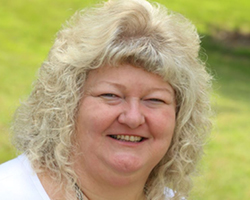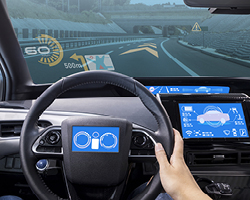Bringing New Technology and Old Industries Up to Speed: Workforce Study on Automated Vehicles Looks at the Future of the Transportation Industry

Shelia Cotten was named an MSU Foundation professor in 2017. She has made significant contributions in the field of communication technology research.
- Shelia R. Cotten, Ph.D.
- MSU Foundation Professor
- Department of Media and Information
- College of Communication Arts and Sciences
Currently, millions of Americans work as professional drivers, either transporting freight, making deliveries, or carrying passengers. As the technology for connected and automated vehicles (CAVs) becomes reality, there are real questions—and real anxieties—as to how CAVs will affect those drivers in particular, but also the entire workforce.
The American Center for Mobility (ACM), a U.S. Department of Transportation designated testing and proving grounds for CAVs, is located on 500 acres adjacent to the historic Willow Run Airport in Ypsilanti Township, Michigan. It provides facilities to companies to conduct testing, research, education, and product development related to CAVs. According to ACM's website, their goal is "to enable the rapid, safe development and deployment of future transportation systems by offering leading programs in testing, standards, and education as a national technology innovation center."
In February 2018, ACM commissioned a workforce study, led by Shelia Cotten, MSU Foundation Professor of media and information, and supported by Texas A&M Transportation Institute, that looks at and quantifies impacts of CAVs on jobs in the transportation industry, especially of truck, taxi, and delivery drivers. The interdisciplinary team of researchers conducted interviews and focus groups of industry leaders about what the next ten years might look like for the industry. Their responses were compiled, analyzed, and put into a report that was released in August 2018.
The report, Preparing the Workforce for Automated Vehicles, summarizes the findings in the following way:
...in the foreseeable future, the adoption of automated vehicles and related technologies may lead to displacement of driving jobs in certain segments of the transportation sector (largely in the taxi and chauffeur segment, though more so in the taxi than chauffeur segments). However, at least in the coming decade, at worst, displaced jobs are likely to number in the low hundreds of thousands compared to the almost 3.5 million jobs in this sector that are the subject of this report. Moreover, much of the anticipated displacement will likely not take place until the latter half of the 2020s, at which point automated vehicle adoption will begin to grow. Automated vehicles will, however, necessitate substantial change in the way that employees perform their job in the transportation and many other sectors. For many, this will require the acquisition of new skills and, in some cases, perhaps reimagining of what their job entails. The advent of automated vehicles is also likely to result in the creation of thousands of new jobs in engineering, data analysis, cybersecurity, and vehicle 'monitoring' areas. It will also require many different stakeholders to work together on creative approaches that better prepare current and future workers to enter the labor force.[1]
Emerging jobs are one of the reasons the ACM called for the study. While the report found that drivers in certain jobs where face-to-face interaction is necessary—limo drivers or elderly-care drivers, for example—will continue to be needed, while those who will be replaced by AVs will need to be trained for other roles.
"The adoption of connected and autonomous vehicles (CAVs) has the potential to lead to job impacts in the transportation and mobility sector and create a range of new labor opportunities in businesses that develop and implement innovative usage models for CAVs," said Cotten.[2]
The study was funded by Waymo, the American Center for Mobility, AARP, and the Toyota Research Institute. Following up on the study's findings, the ACM is working with various partners in education and in the industry to clarify what skillsets will be needed in the future.

As connected and autonomous technology develops, the transportation industry wonders about the impact on the workforce and the economy.
"Our goal is to ensure that employees, employers, and policymakers are informed about the potential developments, so they can approach them proactively rather than reacting to issues as they arise," said Soraya Kim, ACM's Chief Innovation Officer who is leading the education initiative.[2]
Training and education is key to accomplishing this goal, and to that end, ACM is partnering with 15 colleges and universities, including Michigan State University, to create an academic consortium who, together, will develop 'educational pathways,' such as training programs, internships, co-ops, and work study programs, to train the next generation of talent in CAV technology.
For Cotten, training new generations—as well as aging generations—in technology usage in ways that impact social, educational, and physical wellbeing, has been the focus of her career. A sociologist by training, Cotten came to MSU in 2013 as a professor in MSU's College of Communication Arts and Sciences, with affiliations with the Colleges of Social Science, Nursing, and Engineering, allowing her to bring together all of her training and expertise in each area. It was natural for her, therefore, in 2014 to become the inaugural director of the Trifecta Initiative, a partnership of the Colleges of Communication Arts and Sciences, Nursing, and Engineering, designed to be a launchpad for the interdisciplinary development of innovative computing and communication technologies to improve healthcare and address health disparities.
Cotten's teaching, research, and engagement throughout her tenure have embodied the spirit of interdisciplinarity and collaboration. In 2013, she became the recipient of the Public Sociology Award of the Communication and Information Technologies section of the American Sociological Association (CITASA), and in 2016, she was awarded the William F. Ogburn Senior Career Achievement Award from the CITASA section of the American Sociological Association—both awards a testament to her contributions in teaching, innovative developments, and advancement of knowledge for the betterment of all technology users across the lifespan.
Sources
- Yakelevich, A., Rikard, R.V., Kadylak, T., Hall, M., Mack, E., Verboncoeur, J., and Cotten, S. (2018). Preparing the Workforce for Automated Vehicles. Retrieved from https://comartsci.msu.edu/sites/default/files/documents/MSU-TTI-Preparing-Workforce-for-AVs-and-Truck-Platooning-Reports%20.pdf Back to the story
- American Center for Mobility. (2018). American Center for Mobility Partners with MSU, Texas A&M Transportation Institute on Workforce Study (Press Release). Retrieved from
https://www.acmwillowrun.org/american-center-for-mobility-partners-with-msu-texas-am-transportation-institute-on-workforce-study/ Back to the story
- Written by Matt Forster and Amy Byle, University Outreach and Engagement
- Photograph courtesy of MSU Communications and Brand Strategy